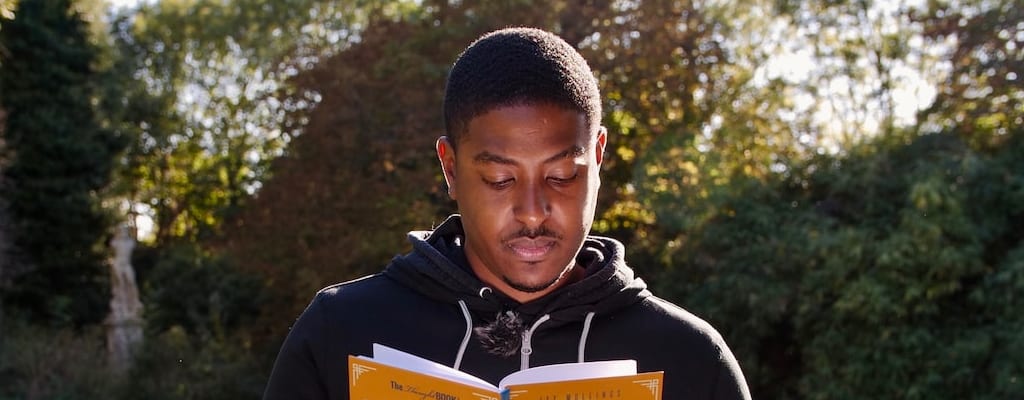lord of the flies: Idiom Meaning and Origin
What does ‘lord of the flies’ mean?
The idiom "lord of the flies" refers to a person or group that becomes vicious or corrupted when there are no rules or authority figures present.

Idiom Explorer
The idiom "the devil" refers to a person or entity that is considered to be evil, dangerous, or destructive. It is often used to emphasize the negative qualities or actions of someone or something, highlighting their malicious or harmful nature.
The idiom "rule the roost" means to be in control or have authority over others, especially in a family or group setting.
The idiom "out of line" means to behave inappropriately or to act in a way that is not acceptable or within the boundaries of what is considered acceptable behavior.
The idiom "on the loose" means to be free or not captured, often used to describe a person, animal, or thing that is roaming or causing trouble.
When something or someone goes "off the rails," it means they have deviated from the normal or expected course of action. It suggests a loss of control or a situation becoming chaotic or out of hand.
The idiom "no flies on" means someone is quick-witted or astute, characterized by being sharp and aware. It implies that the person is not easily deceived or fooled.
It originated from the observation that flies tend to gather around slow or dull-witted individuals, suggesting that a person with "no flies on" them is mentally alert and perceptive.
The idiom *no-count* refers to a person or thing considered worthless or of no value. It is often used to describe someone who is lazy, unreliable, or lacking in ambition or ability.
The idiom "no harm, no foul" means that if no damage or harm has been done, then there is no need to be upset or hold someone responsible for their actions.
Savage Origins
The idiom "lord of the flies" is derived from the famous novel of the same name, written by William Golding and published in 1954. The novel tells the story of a group of British schoolboys who become stranded on an uninhabited island after their plane crashes during a wartime evacuation. The idiom itself refers to the inherent evil and savagery that can arise in human beings when they are stripped of the constraints of civilization and left to their own devices.
In the novel, the boys initially attempt to establish a society based on democratic principles, but as the story unfolds, their efforts descend into chaos and brutality. The character of "the lord of the flies" is a severed pig's head that is worshipped as a symbolic representation of the boys' inner evil. It is during a hallucinatory encounter with this grotesque figure that the protagonist, Ralph, realizes the true nature of humanity.
The idiom "lord of the flies" is often used in discussions about human nature and the effects of isolation on individuals or societies. It serves as a cautionary metaphor, highlighting the fragility of civilization and the thin line between impulsive violence and rational behavior.
The first related idiom to consider is "law of the jungle." This idiom refers to a situation where there are no rules or order, and only the strongest survive. In "Lord of the Flies," the boys find themselves in a similar situation on the uninhabited island. With no authority figures or established rules, they are left to fend for themselves and quickly descend into chaos. The novel explores the consequences of a society that follows the "law of the jungle" and the innate savagery that can emerge.
Another related idiom is "go rogue." This phrase typically describes someone who acts independently and outside the boundaries of established norms or rules. In "Lord of the Flies," several characters can be seen as going rogue. For example, Jack, one of the boys, decides to lead his own group and go against the established order. He becomes increasingly violent and obsessed with hunting. His actions showcase the dangers of going rogue and the potential for individuals to abandon reason and morality when given unchecked power.
The final related idiom is "rule the roost." This phrase refers to someone who has complete control or authority over a situation or group of people. In the novel, Jack eventually takes control and rules the roost, so to speak. He establishes his own tribe and imposes his will on the rest of the boys. Under his leadership, the group becomes more tyrannical and loses sight of their initial goals. This example demonstrates the consequences of allowing someone with unchecked power to rule the roost and the potential for abuse and corruption.
Over the years, the phrase "lord of the flies" has come to represent the potential for darkness and savagery that lies within individuals or groups when social order and authority break down. It serves as a cautionary metaphor, highlighting the fragility of civilization and the thin line between impulsive violence and rational behavior.
"Lord of the Flies" is a thought-provoking novel that explores the darker aspects of human nature. Through the idiom "lord of the flies," we can better understand the consequences of a society that follows the "law of the jungle," the dangers of individuals who "go rogue," and the potential for abuse and corruption when someone begins to "rule the roost." While the idiom is primarily associated with the novel and its themes, it can also be employed in a broader context to describe situations where individuals or groups are driven by base instincts and abandon reason and compassion.
However, it is essential to note that the idiom "lord of the flies" is not necessarily representative of the reality of human nature. While Golding's novel presents a grim portrayal of the potential for evil, it is just one interpretation among many. Human behavior is complex and multifaceted, and the circumstances in which individuals find themselves can greatly influence their actions. It is up to each person to rise above their primal instincts and strive for compassion, reason, and a society that values cooperation over chaos.
Example usage
1. After the power outage, the children at the camp became like a "lord of the flies," with no adults to guide them and chaos ruling over the group.
2. The company's board of directors turned into a "lord of the flies," as each member fought for their own interests and refused to come to a consensus.
3. In an abandoned city, the remaining survivors formed tribes and fought each other for control, behaving like "lords of the flies" in the absence of a central governing authority.
More "Books" idioms



